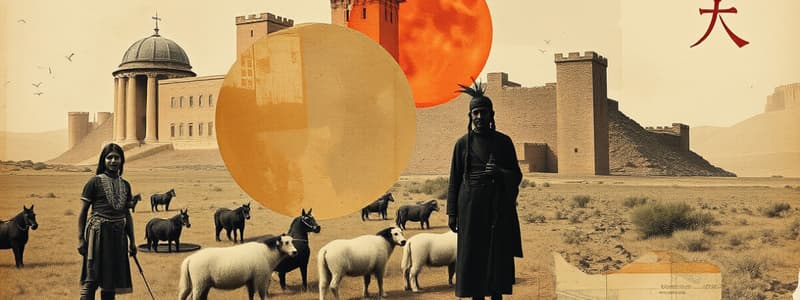Podcast
Questions and Answers
What significant discovery did George McJunkin make in 1908?
What significant discovery did George McJunkin make in 1908?
- A stone tool workshop
- The largest bison bones (correct)
- A collection of ancient pottery
- Gold artifacts
The Clovis people were thought to be the first Americans for decades after the discovery of the Clovis culture.
The Clovis people were thought to be the first Americans for decades after the discovery of the Clovis culture.
True (A)
In what year did James Ridgely Whiteman discover fluted points associated with mammoth bones?
In what year did James Ridgely Whiteman discover fluted points associated with mammoth bones?
1929
The Clovis culture is believed to date back approximately ________ years.
The Clovis culture is believed to date back approximately ________ years.
Match the following extinct animals with their descriptions:
Match the following extinct animals with their descriptions:
What evidence was found at the Blackwater Draw site?
What evidence was found at the Blackwater Draw site?
The evidence suggests that Clovis people arrived in North America earlier than pre-Clovis people.
The evidence suggests that Clovis people arrived in North America earlier than pre-Clovis people.
What type of environment did the Clovis people thrive in?
What type of environment did the Clovis people thrive in?
What type of large animals did the Clovis people primarily hunt?
What type of large animals did the Clovis people primarily hunt?
The Clovis people exclusively hunted large game animals.
The Clovis people exclusively hunted large game animals.
What are Clovis points primarily made of?
What are Clovis points primarily made of?
The Clovis people likely lived in ______ shelters and tents.
The Clovis people likely lived in ______ shelters and tents.
Match the Clovis site types with their descriptions:
Match the Clovis site types with their descriptions:
Which technology aided the Clovis people in hunting?
Which technology aided the Clovis people in hunting?
The Clovis culture lasted for thousands of years without change.
The Clovis culture lasted for thousands of years without change.
What evidence suggests that the Clovis people used water control systems?
What evidence suggests that the Clovis people used water control systems?
More than ______ Clovis points have been found in North America.
More than ______ Clovis points have been found in North America.
What is one possible reason for the decline of the Clovis culture?
What is one possible reason for the decline of the Clovis culture?
Flashcards are hidden until you start studying
Study Notes
Discovery of the Clovis People
- In 1908, a flood in northern New Mexico exposed ancient bison bones, leading to significant archaeological interest.
- Amateur archaeologist James Ridgely Whiteman discovered fluted points with mammoth bones in 1929 at Blackwater Draw, marking a pivotal site in human history.
- Excavations began in 1932, revealing ancient spearheads, stone tools, and evidence of human occupation dating back 13,000 years.
Clovis Culture and Early Settlement
- Clovis culture suggests early Americans migrated from Siberia to Alaska via a land bridge, later moving south through an ice-free corridor after the last Ice Age.
- Research indicates pre-Clovis people may have arrived in the Americas as far back as 20,000 years ago, challenging the notion of Clovis as the first Americans.
Big Game Hunting and Lifestyle
- The Clovis people thrived in environments populated by large animals like mammoths, giant bison, and saber-toothed tigers.
- Artifacts found at the kill sites demonstrate advanced hunting techniques with projectile points that exhibit signs of use against large game.
- Clovis diet included a diverse range of animals, and they also gathered seeds, nuts, and roots, indicating opportunistic foraging.
Tools and Technology
- Clovis tools include scrapers, drills, blades, and fluted spear points known as Clovis points, finely crafted from materials like flint and obsidian.
- Over 10,000 Clovis points have been discovered across North America, dating back around 13,500 years, signifying a widespread cultural phenomenon.
- The efficient toolkit of the Clovis people enabled quick processing of large game.
Social Structure and Habitation
- Although primarily nomadic, Clovis people established campsites and engaged in seasonal migrations based on food availability.
- Evidence from Blackwater Draw indicates habitation for about 600 years, with the construction of the earliest known water control system in North America.
- Limited knowledge exists about their social structures, diet, clothing, and beliefs, with only one burial of an infant discovered in Montana linked to modern Native American ancestry.
Extinction and Cultural Evolution
- The Clovis culture ended around 12,900 years ago, likely due to climate changes and the extinction of large fauna.
- Adaptation to changing environments resulted in the emergence of post-Clovis cultures, including Folsom in New Mexico.
- Innovations such as improved spear points and atlatls facilitated continued survival and hunting practices beyond the Clovis period, influencing subsequent Native American cultures.
Studying That Suits You
Use AI to generate personalized quizzes and flashcards to suit your learning preferences.

